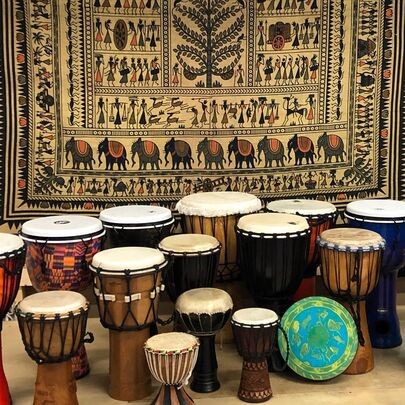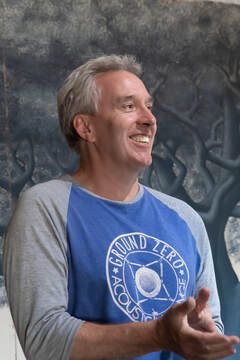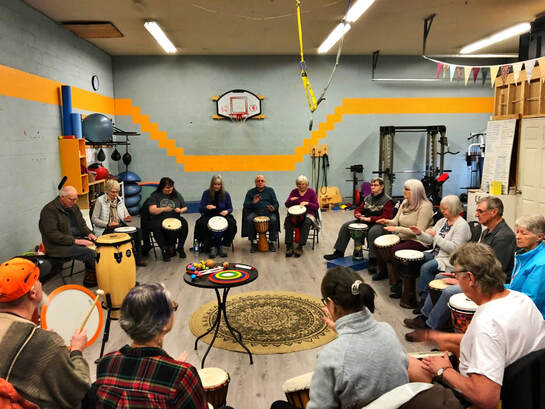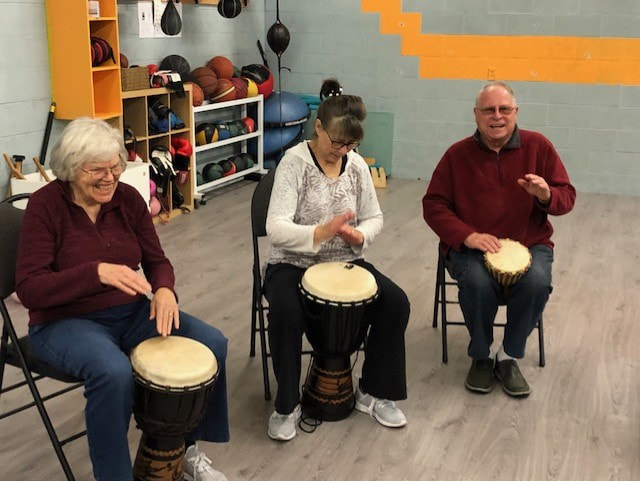CLASSES

Join instructor Doug Pickard for this fun-filled class that will show you how to love your life to the fullest by creating music using your hand-drums, your voice and simple percussion instruments. No musical experience or ability is necessary! This is not a "drum-circle"; rather it is a guided therapeutic class, providing a nurturing environment that will allow your skills to slowly develop and flourish
This class will focus on the healing qualities of music, and is therefore best suitable for those living with chronic illness such as Alzheimer's Disease, Parkinson's Disease, Anxiety Disorders and Stroke Recovery patients, to name but a few of the conditions that this class will be tailored towards. The class is however open to anyone who wants to benefit from the healing power of music. Our facility is mobility-friendly with no stairs to tackle. CARE PARTNERS WELCOME - by donation
COST: 8-PASS PUNCHCARD FOR $64 ($8 PER CLASS) OR $10 DROP-IN (or what you can afford. No one will be refused for lack of funds!)
Drums & percussion instruments will be provided, but feel free to bring your own as well
For more information: please email [email protected] or phone 250-927-4595

Doug Pickard has worked with people living with chronic illness for many years as an exercise specialist. He is the owner operator of Oceanside Rock Steady Boxing, a non-contact boxing program for those living with Parkinson's Disease. As well, he is the instructor/leader for Minds in Motion, a special exercise/social group for those with early-onset Alzheimer's Disease. More recently Doug was hired to run the musical therapy program for the Oceanside Stroke Recovery program. He volunteers his time leading the local Parkinson's Disease Support Group and as a Davis Phinney Foundation Ambassador, one of only two ambassadors in Canada. As well. Doug takes his rhythm class into the field, offering his services at remote locations like Trillium Lodge (long-term care facility).
A drummer since the age of 12, Doug is about to receive the training necessary to became a REMO HealthRHYTHMS® facilitator. HealthRHYTHMS® is a fun, evidence-based whole person strategy which promotes socialization and ensures a healthy non-strenuous workout. On a deeper level it builds bridges while fostering nurturing, support, camaraderie, self-respect and respect for others. It is not really about drumming, but uses the drum as a tool for communication and personal expression.
Doug is a life-long musician and he firmly believes in the magical healing power of music. He has witnessed this power first hand, and is eager to help those struggling with illness to discover a new, non drug-based form of therapy
A drummer since the age of 12, Doug is about to receive the training necessary to became a REMO HealthRHYTHMS® facilitator. HealthRHYTHMS® is a fun, evidence-based whole person strategy which promotes socialization and ensures a healthy non-strenuous workout. On a deeper level it builds bridges while fostering nurturing, support, camaraderie, self-respect and respect for others. It is not really about drumming, but uses the drum as a tool for communication and personal expression.
Doug is a life-long musician and he firmly believes in the magical healing power of music. He has witnessed this power first hand, and is eager to help those struggling with illness to discover a new, non drug-based form of therapy
HERE ARE A FEW RESEARCH-BASED EXAMPLES OF THE BENEFITS OF MUSIC:
- Improves mood. Studies show that listening to music can benefit overall well-being, help regulate emotions, and create happiness and relaxation in everyday life.
- Reduces stress. Listening to ‘relaxing’ music (generally considered to have slow tempo, low pitch, and no lyrics) has been shown to reduce stress and anxiety in healthy people and in people undergoing medical procedures (e.g., surgery, dental, colonoscopy).
- Lessens anxiety. In studies of people with cancer, listening to music combined with standard care reduced anxiety compared to those who received standard care alone.
- Improves memory. Research has shown that the repetitive elements of rhythm and melody help our brains form patterns that enhance memory. In a study of stroke survivors, listening to music helped them experience more verbal memory, less confusion, and better focused attention.
- Eases pain. In studies of patients recovering from surgery, those who listened to music before, during, or after surgery had less pain and more overall satisfaction compared with patients who did not listen to music as part of their care.
-Provides comfort. Music therapy has also been used to help enhance communication, coping, and expression of feelings such as fear, loneliness, and anger in patients who have a serious illness, and who are in end-of-life care.
- Improves cognition. Listening to music can also help people with Alzheimer’s recall seemingly lost memories and even help maintain some mental abilities.
- Improves mood. Studies show that listening to music can benefit overall well-being, help regulate emotions, and create happiness and relaxation in everyday life.
- Reduces stress. Listening to ‘relaxing’ music (generally considered to have slow tempo, low pitch, and no lyrics) has been shown to reduce stress and anxiety in healthy people and in people undergoing medical procedures (e.g., surgery, dental, colonoscopy).
- Lessens anxiety. In studies of people with cancer, listening to music combined with standard care reduced anxiety compared to those who received standard care alone.
- Improves memory. Research has shown that the repetitive elements of rhythm and melody help our brains form patterns that enhance memory. In a study of stroke survivors, listening to music helped them experience more verbal memory, less confusion, and better focused attention.
- Eases pain. In studies of patients recovering from surgery, those who listened to music before, during, or after surgery had less pain and more overall satisfaction compared with patients who did not listen to music as part of their care.
-Provides comfort. Music therapy has also been used to help enhance communication, coping, and expression of feelings such as fear, loneliness, and anger in patients who have a serious illness, and who are in end-of-life care.
- Improves cognition. Listening to music can also help people with Alzheimer’s recall seemingly lost memories and even help maintain some mental abilities.


